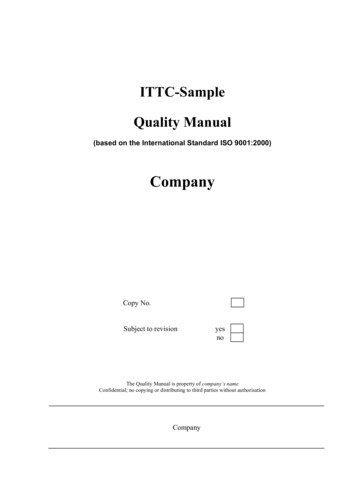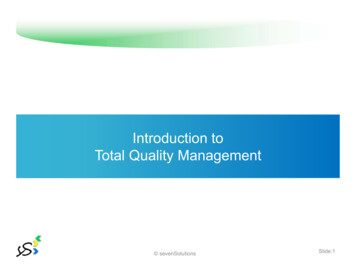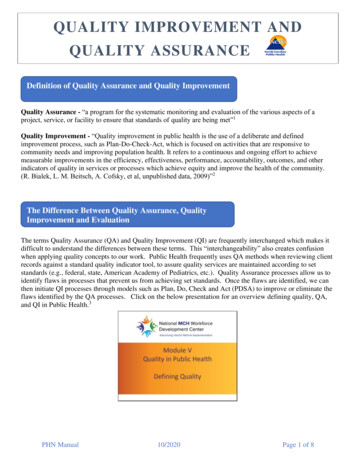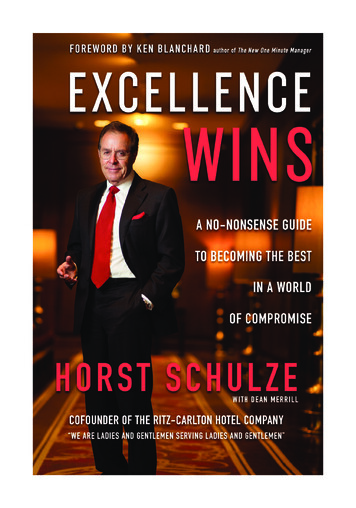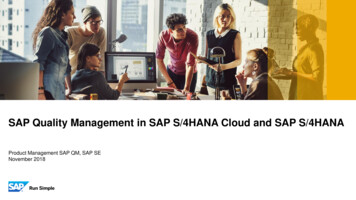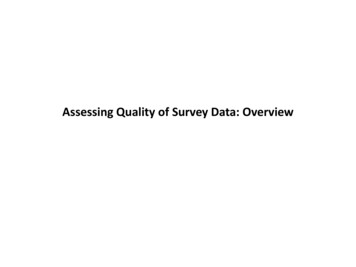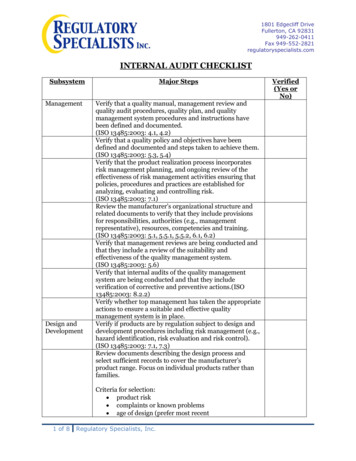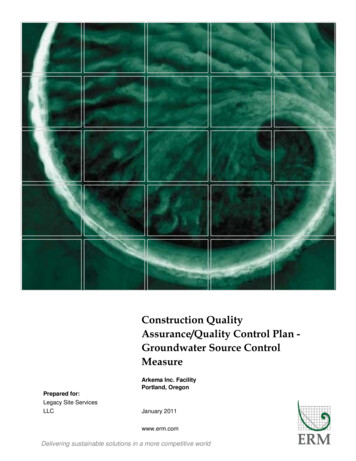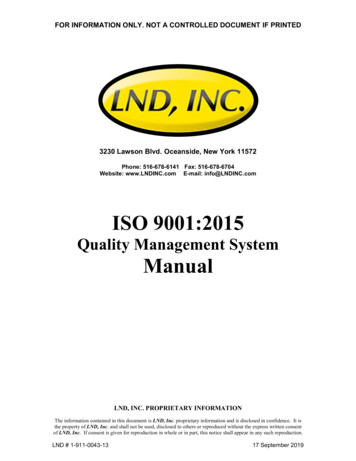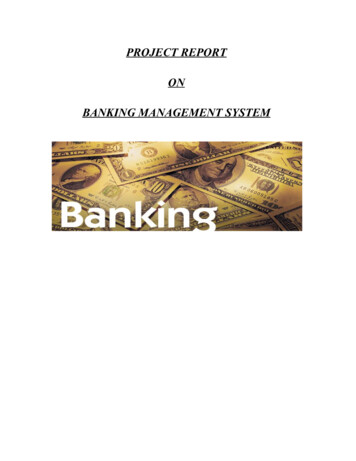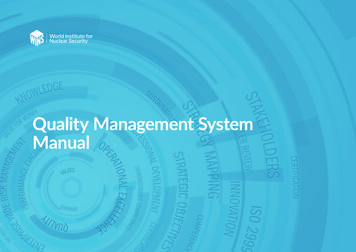
Transcription
World Institute forNuclear SecurityQuality Management SystemManualQMS Manual1
2QMS Manual
Quality Management System ManualAs the Executive Director of WINS, I acknowledge my responsibility to uphold the quality of ourorganisation. I also expect every staff member and contractor working for WINS to demonstratethe same commitment and ownership of quality standards and to drive continuous improvementin our processes and performance.Dr Roger HowsleyExecutive DirectorAugust 2018QMS Manual3
4QMS Manual
CONTENTSWINS Quality Management System Manual 6Introduction 6WINS Context and Stakeholders 9Scope of QMS 9WINS Landscape 10Leadership and Commitment 11Addressing risks and opportunities 11Resources 11The WINS Programme 14Quality Management and Control Systems 18Annex 1: Index of WINS Quality Management Processes and Procedures 22QMS Manual5
WINS QUALITY MANAGEMENT SYSTEM MANUAL1. INTRODUCTIONThis manual describes the WINS’ Quality Management System(QMS), which has been continuously revised and improved as ourstrategy has developed over the last 10 years of operation. Ourstrategy is defined in a series of interlinked strategy documentsthat include Stakeholder Engagement, Events and ProgrammeObjectives, the WINS Academy, Finance and Funding, andImproving Internal Processes. These are internal WINSdocuments, as are most of our quality management processesand procedures, a list of which is in the Annex 1. We adopt arisk-based approach to our management systems and constantlyseek new opportunities for providing more effective and efficientservices, and continuously improving our systems and processes.WINS’ QMS has been certified compliant with ISO 9001:2008since 2012 and with ISO 29990:2010 since 2014. The last revisionof the QMS Manual was developed in line with revisions to ISO9001:2015 against which WINS is currently certified.Who we areThe World Institute for Nuclear Security was launched in 2008(and began operations in January 2009) with the mandate toshare best practices for nuclear security management1 with ourmembers and the nuclear community. Based in Vienna, we area not-for-profit international non-governmental organisation(INGO) under Austrian law.6QMS Manual1WINS has achieved broad international and political recognitionin the nine years since its formation. Our work is fullyconsistent with the IAEA’s longstanding work in the field ofnuclear security, including its recommendations and guidanceregarding the urgent need to improve the security of nuclearand other radioactive material worldwide. We have published35 International Best Practice Guides on numerous topicsrelating to the management of nuclear security and held over 80international workshops and events in over 20 countries on fivecontinents. Our growing membership now comprises over 4,700individuals and organisations from 128 countries.While carrying out our work, it became increasingly clear tous that a strong need existed for professional developmentand certification opportunities for personnel with nuclearsecurity responsibilities. To meet such a need, we launchedthe WINS Academy in 2014. The programme is centred on acore philosophy that views security as a strategic activity to beimplemented across nuclear-related organisations and as part ofan integrated management system with close links to safety andoperations. Nuclear security is a fundamental component of riskmanagement and corporate reputation.When we refer to nuclear security management we are also referring to the security of other radioactive materialsthat may be used, for example, in medical institutes, in industry, mining or agriculture.
The Academy programme, which can be completed entirelyonline, consists of a required Foundation Module plus nineelective modules. After completing the selected modules,participants can sit for proctored exams; those who pass receivecertification from WINS. The Foundation Module plus threeelectives were available by the end of 2014; all nine electivemodules were made available by September 2016, and these havebeen updated, revised and restructured to reflect current trendsand issues. By August 2018 the Academy had grown to over 1,200participants from over 80 countries.To reflect our new emphasis on professional development andcertification, we revised our Vision and Mission Statementsin 2016:WINS is one of a number of organisations that share the desirefor nuclear security to become more effective across the world.The efforts of the IAEA and its Member States and thestatements made at the Nuclear Security Summits and NuclearIndustry Summits are all examples of the importance of thisinternational goal.To develop our External Strategic Objectives, we identifiedobjectives that WINS and External Stakeholders consider ofimportance and against which we want to see internationalprogress by 2020. They are listed below and been revised in linewith developments and the strategic guidance of the WINS Board:1.WINS VisionAll nuclear and other radiological materials and facilitiesare effectively secured by demonstrably competentprofessionals applying best practice to achieve operationalexcellence.WINS MissionTo be the leader in professional development andcertification for nuclear security management.Demonstrable competence increasingly becomes alicensing requirement for personnel with accountabilitiesfor nuclear security, including the regulatory requirementfor professional certification of key nuclear securitymanagement positions.2. The IAEA’s nuclear security programme promotesstructured professional development and voluntarycertification, and the IAEA has entered into joint nuclearsecurity certification programmes with training institutes,including WINS.3.An increasing number of organisations, includingregulators, operators, police and responsiblegovernment departments, publish meaningfulgovernance reports about the “corporate” oversightof their security programmes.QMS Manual7
4. An effective and sustainable international industry forumis operating to implement the recommendations andcommitments made during the Nuclear Industry Summits.8. Nuclear safety and security continue to coalesce, and moreof the nuclear safety-related disciplines and managementattitudes are used to enhance nuclear security.5. A sustainable peer review programme for nuclearsecurity management practices has been implementedby operating organisations in some countries andbenchmarking studies with organisations of othersensitive industries are regularly conducted.9. Cyber security and physical protection arrangements areproperly integrated as part of an all-risks approach to thesecurity programme.6. Security is increasingly seen as a strategic issue fornuclear-related organisations (as is safety) rather than asa regulatory burden, and extends to commercial security,business continuity and reputational issues.7. Security programmes are subject to the businessdisciplines of effectiveness (performance tested)and efficiency, and security regulations areperformance-based.8QMS Manual10. High quality professional development programmesthat focus on promoting an inclusive and diverse nuclearsecurity profession are more evident in the sector.WINS constantly reflects on how we can contribute tothese external objectives and is committed to doingwhat we can to help achieve them. We are now activelyconsidering with our Board the External StrategicObjectives for 2025.
2. WINS CONTEXT AND STAKEHOLDERS2Because we operate in the field of nuclear security, we understand that our mission and strategy couldbe influenced by external events and factors such as 1) whether a significant nuclear security incidentoccurs that generates major political and public demands for change, 2) the extent to which theinternational community views nuclear security as a priority, and funds it accordingly, 3) how theIAEA’s nuclear security programme evolves in the years ahead, and 4) whether other organisations areestablished or evolve to compete with or complement WINS. While working to fulfil our mission andimplement our strategy, we constantly monitor external events so that we can respond flexibly andrevise our strategy accordingly.We have used a strategy mapping process to analyse and structure our quality management systemand have focused on four major areas: 1) Stakeholder Perspective, 2) Financial Perspective, 3) InternalProcesses and 4) Learning & Growth Perspective. As a not-for-profit organisation, we understand thathow we engage with our stakeholders, how we approach and coordinate our fundraising efforts, andhow we promote our strategic objectives all affect our strategic development and sustainability.3. SCOPE OF QMSTo help achieve excellence in nuclear securityimplementation, we have examined each of ourinternal processes for alignment and structuredthem around four programmatic activities:2WINS FINANCIALPERSPECTIVEWe have also incorporated the followingsupport processes:Website & Communication.Sharing Operational Experience.––Membership Management.––The WINS Knowledge Centre.––Quality Management & Control Systems.––Training and Certification.––Benchmarking and Evaluation Activities.ISO 9001:2015; §4 Context of the organisationSTAKEHOLDERPERSPECTIVEWINS INTERNALPROCESSES––––WINS VISIONAND MISSIONWINS LEARNINGAND GROWTHPERSPECTIVEWINS VALUESQMS Manual9
4. WINS LANDSCAPETo determine and align the strategic objectives with our work programme and internal processes, we use a Strategy Map thatsummarises the relationship between the various perspectives that were described earlier. The Map is shownWorldbelow:Institute forStrategy MapNuclear SecurityWINS VisionWINS VISIONAND MISSIONSTAKEHOLDERPERSPECTIVEWINS FINANCIALPERSPECTIVEWINS MissionAll nuclear and other radiological materials and facilities are effectivelyTo be the leader in professional development and certificationsecured by demonstrably competent professionals applying best practicefor nuclear security managementto achieve operational excellenceWINS 2020 External Strategic ObjectivesCivil SocietyIAEAFundersPartnersStrategic Developmentand TWINS LEARNINGAND GROWTHPERSPECTIVEWINS VALUES10QMS ManualKNOWLEDGECENTREWINS Programme- Workshops- Webinars- Membership forumSupport ProcessesQuality Management & Control SystemsProfessional developmentof WINS staffHonestyIntegrityInnovation of services andtechnologyProfessionalism- Best Practice Guides- Special ReportsComprehensiveperformance evaluationCommitment toquality and servicesLawEnforcementPolicyMakersValue drivenTRAINING ANDCERTIFICATION- On-line and blendedlearning- Certification exams- Alumni networkWebsite & CommunicationStakeholder ION OFSTRATEGIC WINS N- Self assessment tools- Organisational competencyassessment- Peer reviewsMembership ManagementBroad scanning of strategicdevelopmentsPassion forinnovationStrategicthinking
5. LEADERSHIP AND COMMITMENTWINS is led by an Executive Director and operates under thestrategic guidance and oversight of a Board of Directors.The WINS’ Governing Statute and P02 WINS Board GovernanceManual define our Board’s role and responsibilities and interfacewith the management of the organisation.The Executive Director demonstrates overall responsibility forthe QMS3 by:1.Taking accountability for the effectiveness of the QMS.2. Ensuring that quality policies and objectives areestablished for the QMS and that they are compatiblewith WINS’ strategic direction and context.3. Ensuring that the QMS is communicated, understoodand applied within the organisation.4. Ensuring the integration of the QMS requirements intoour processes.5. Promoting awareness of the process approach.6. Ensuring that the resources needed are available.7. Ensuring that the QMS achieves its intended results.8. Promoting continual improvement.In June 2018, the WINS Board adopted a revised Statute for theorganisation and Board Governance Manual (P02) that constitutethe framework for good governance and assurance at WINS.3WINS expects its staff to maintain the highest standards ofintegrity at all times when conducting the affairs of WINS.The WINS’ Code of Conduct defines WINS’ values andcommitment to complying with the requirements guiding WINSstatus as an INGO. The overriding principles upon which thisCode is based are the duties of care to employees and loyaltytoward WINS. Further details are described in P01 WINS Code ofConduct.6. ADDRESSING RISKS AND OPPORTUNITIESWe have considered external and internal parameterswhen setting the framework for management of risks andopportunities as an integrated component of the WINS Strategy.The overall objective has been to identify, assess and managestrategic risks and opportunities that could affect the viability ofour organisation.These are defined in P03 Management of Risks and Opportunities andthe current Risk Assessment and Risk Register 4.7. RESOURCESThe Executive Director and the Board are responsible for helpingto ensure that we have the resources needed to implement ourstrategy. WINS has been successful in raising stable levelsof funding since its launch, equivalent to approximately3M euros/annum.ISO 9001:2015; §5.1.1 Leadership and commitment for the quality management system.The WINS Risk Assessment and Risk Register is an evolving document that is updated continuously in thelight of new risks as well as assessment of existing risks as correlated with control and response measures.4QMS Manual11
PeopleOur people contribute to our success in achieving our goalsand raising our profile. We have developed our CompetencyFramework in respect of our overall strategic objectives and thevision and mission they support, underpinned by our core values.This Framework is designed to support and enhance the WINSperformance management process. We aim to use it to:a. Define what is required in a given role,Because WINS is committed to personal and professionaldevelopment, all staff members are encouraged to continuedeveloping new skills. The Executive Director / Line Managermeets with each staff member at least every 6 months to assesstheir performance6 and agree SMART targets. Each personprepares a brief assessment of their achievements duringthe preceding period and proposes goals and targets for theforthcoming period, including personal development needs.The performance discussion covers topics such as:b. Set the development targets to achieve higher levels ofperformance, andc. Ensure a competency-based recruitment andselection process.––Successes in achieving or exceeding personal goalsand how the member of staff has contributed to WINSteamwork and our culture.––The identification of any obstacles or difficulties inachieving the objectives and proposed improvements.––Training and Professional Development needsand opportunities.––A reiteration of the importance of adhering to our qualitystandards and the WINS Code of Conduct (P01).These are defined in P04 Competency Framework.On a rolling basis, the Executive Director and management teamupdate the forward business plans that include requirementsand forecasts for the work environment, financial resources, andstaff; these are presented to the Board for review and guidance.The Executive Director ensures5 that people are assigned to rolesbased on their education, training, skills and competencies.Furthermore, the Executive Director ensures that theresponsibilities and authorities for relevant roles are assigned,communicated and understood within the organisation. (Theseare defined in the WINS Organisational Chart.)12QMS ManualWe periodically organise team building events to discussselected topics relevant to the organisation, such as the WINSstrategy, teamwork, internal and external communication andimprovement of our QMS.56ISO 9001:2015; §7.2 Competence.ISO 9001:2015; §7.1.5 Monitoring and measuring resources and §7.1.6 Organisational knowledge.
Infrastructure and work environmentExternal providersWe maintain an infrastructure that is healthy and safe so that itcontinues to meet our needs. This includes people’s workspace,equipment, software, and telecommunications support.In December 2017 we moved to new, un-serviced office premisesthat provide an improved working environment at a significantlycheaper price.WINS depends on support from external providers of servicesto achieve its goals and objectives. We seek external providerswho offer products and services that meet our high standardsand expectations and who understand our needs. Externalproviders that subsequently don’t meet our quality and servicerequirements are no longer used by WINS.Further information on our working arrangements, workingenvironment and IT security and infrastructure, and BusinessContinuity Plans are defined in:The specific requirements, criteria for selection, and methodsof monitoring, evaluating, and re-evaluating the performanceof external providers are defined in P08 WINS External ProvidersSelection and Evaluation.––P05 Working Arrangements.––P06 Health, Safety and Security.––P07 WINS Information Technology Security.––P19 Business Continuity Plan.QMS Manual13
8. THE WINS PROGRAMMEAs illustrated in the following diagram, our programme hasbeen structured around four main work streams that enablenuclear security practitioners and their organisations to benefitfrom multiple and progressive opportunities for professionaldevelopment and related services. Our work streams andassociated processes support the achievement of ourStrategic Objectives.We have designed our processes to enable us to continuallyimprove our services and activities. Because we are alwayslooking for ways to share best practices with the nuclear securitycommunity, they need to be flexible, creative and dynamic.We see the elements of the WINS programme as a toolbox thatenables us to customise our offerings and provide our customerswith the best possible services for their needs.SHARINGOPERATIONALEXPERIENCESWINS Programme- Workshops- Webinars- Membership forumSupport ProcessesQuality Management & Control SystemsWINS INTERNALPROCESSESWe have outlined our main processes on the following pages;each one is described in detail in a separate quality managementdocument.14QMS ManualKNOWLEDGECENTRE- Best Practice Guides- Special ReportsTRAINING ANDCERTIFICATION- On-line and blendedlearning- Certification exams- Alumni networkWebsite & CommunicationEVALUATION- Self assessment tools- Organisational competencyassessment- Peer reviewsMembership Management
Sharing Operational ExperienceKnowledge CentreThis work stream is the main platform for WINS membersand other nuclear security practitioners to exchange theirexperiences and lessons learned from implementing securityprogrammes for nuclear and other radioactive materials inuse, storage and transport. Examples of activities includeworkshops, international operational consultation sessions(IOCS), webinars, roundtables and other pertinent events.Building on the outputs of its work stream on Sharing OperationalExperience, WINS disseminates best practices and other usefulinformation that practitioners can use to effectively strengthennuclear security. We do this through the Knowledge Centre thatis available to all members.They include both face-to-face (workshops, roundtables)and virtual (webinars, internet forums) opportunities forinformation exchange.The major focus of such activities is on the identification ofnuclear security best practices and on increasing the awarenessof managers and other individuals with security responsibilitiesabout the credible threats, possible consequences of maliciousacts, and best approaches for implementing cost effectivesecurity arrangements. We seek to ensure that all our eventsare interesting, innovative and highly interactive. We useWe revise the best practice guidance based on new information,and also provide a range of Special Reports for our members ontopical subjects. WINS has the advantage that we can be agileand write or commission special reports on subjects such asradicalisation, advanced technologies and evolving threats.Details on the processes we use to research, compile and reviewour reports are described in P10 Developing and Publishing BestPractice Guides and Other Special Reports.professional facilitators to help design and manage ourworkshops so that the workshops are as effective as possible,and provide all participants with the opportunity to contributeand learn.Details on operational planning and control7 —from determininginputs and defining detailed processes —to final outputs, aredescribed in P09 Organising and Conducting Workshops, Webinarsand Other Events.7ISO 9001:2015; §8 Operations.QMS Manual15
Training and CertificationThis work stream comprises the WINS Academy, which offers asuite of certified professional development courses covering arange of relevant subject areas as shown in the diagram below:Participants that successfully pass their examinations are invitedto join the WINS Academy Alumni. This enables WINS to stayengaged with the Academy graduates to better understand ifand how the certification programmes have contributed to theirprofessional standing, responsibilities and salary, amongstother metrics.This feedback is essential to establish the value of the Academyprogramme and whether it is making a sustainable difference toprofessional capacity and competence.Details on the Academy Programme and its quality processes aredescribed in P11 WINS Academy Curriculum Development Procedureand in P12 Managing Certification Programmes.Benchmarking and EvaluationThis work stream provides the nuclear community withassessment tools that help to identify possible improvementsand to benchmark facilities and organisations. All of ourBest Practice Guides in the Knowledge Centre include a selfassessment questionnaire that helps organisations assess theirperformance on a 5-point scale from Resilient (1) to Vulnerable(5). The tools available for benchmarking and evaluation extendthe opportunities for organisations to assess their performanceby providing methodologies for peer review, employee attitudesurveys, etc.There are currently over 1,200 participants enrolled in theAcademy programme worldwide. When participants completetheir studies, they are encouraged to take examinations inproctored conditions at test centres to demonstrate what theyhave learned.16QMS ManualDetails on the processes we use to conduct peer reviews aredescribed in P20 Organising and Conducting Peer Reviews.
Website and CommunicationWINS MembershipWe use our website, the face of WINS, to:WINS is a membership-based organisation comprised of bothindividuals and corporate members. Our members constitute arich, varied community drawn from industry, government, lawenforcement, and academic and research institutions.WINS enables its members to exchange ideas, network,promote leadership, and increase their professionaldevelopment. We continually strive to maintain high levels of––Promote WINS activities in ways that encourageapplications for membership from people who haveaccountabilities for nuclear security and who wish toactively support us.––Encourage members to participate in events, collaboratein the online community, and contribute to the materialswe publish.––Promote the WINS Academy professional development andcertification programme and provide information aboutthe Academy to potential and enrolled participants.––Offer materials and information with a clear operationalfocus that cannot be obtained anywhere else.––Communicate on past and forthcoming WINS events andpublications and provide news items about WINS.––Promote feedback from our members to help ensure thatwe respond to their needs.member satisfaction and increase membership by providingrelevant, high quality services.Details on how WINS membership is managed and administeredare described in P14 Membership Procedures.Details are described in P13 Website and CommunicationManagement.QMS Manual17
9. QUALITY MANAGEMENT ANDCONTROL SYSTEMSMonitoringWe define the key performance indicators and monitor andmeasure our performance against set targets. In accordance withISO 9001:2015, we determine:a. The indicators that need to be monitored and measured,b. The methods used to monitor, measure, analyse andevaluate these indicators,c. The frequency and timeline for monitoring andmeasuring, andDocumented InformationThe documented information required by the qualitymanagement system is managed and controlled as set outin Clause 7.5 of ISO 9001:2015. Details are described in P15Documented Information.Financial managementWe have defined internal accountabilities and appointed thirdparty external auditors to ensure regular control of our financesand the accuracy and adequacy of our financial managementand control.In doing so, we aim to achieve the following:––Our financial management complies with externalaccounting requirements and principles.––Our operations and projects comply with our financialcontrol policies.QMS Process.––Our projects finish on time and within budget.The Executive Director and management team take an active rolein achieving, and continually improving, how we respond to theneeds, requests and feedback from different organisations andgovernments. This includes reviewing external feedback andtaking appropriate actions for improvement.––Our staff report on the adequacy of our resource levels.––Our Board and funding organisations are satisfied with ourprogress and financial reports.d. The process used to analyse and evaluate the results.We regularly review the relevance of our indicators and adaptthem to meet our strategic needs. Our KPIs are listed in each18QMS ManualFurther details are described in P16 Financial Procedures and P17Expenses Reimbursement Procedure.
Reporting Serious ConcernsWINS encourages its staff, including fulltime employees, costfree experts, seconded experts and interns, to raise any concernsthey may have within the organisation and report any suspectedor actual occurrence(s) of illegal, unethical or inappropriateactions so that an investigation and appropriate actions can betaken. We expect line management to take effective action toaddress concerns but if, for whatever reason, the complainantfeels it necessary to escalate the issue above their line managerthen they are encouraged to use the procedure for reportingserious concerns. WINS is committed to protecting employeeswho report wrongdoing in accordance with this policy, as wellas those who may be wrongly or falsely accused, from unduenegative repercussions.Further details are described in P18 Policy for ReportingSerious Concerns.Internal AuditIn compliance with Clause 9.2 of ISO 9001:2015 and Clause 4.9 ofISO 29990:2010, we conduct internal audits at planned intervalsto determine whether our quality management system:a. Conforms to the requirements set by these InternationalStandards, as well as to the Quality Management Systemrequirements established by WINS, andb. Is effectively implemented and maintained.8ISO 9001:2015 §9.2.2Internal audits are undertaken at least once annually.We may initiate them with a greater frequency if determinedby QMS requirements, corrective actions, statutory/legalrequirements, management decision, concerns raised bythird parties / third party audits, employee concerns, ormanagement review concerns.Due to the small size of our organisation and theinterconnectivity of our team members, we may carry outinternal audits by employing an independent expert outsidethe organisation, who has been selected on the basis of his/her qualifications and demonstrable experience in similarorganisations, to work together with assigned internal staff.The audit team:a. Defines the audit criteria and scope of each audit.b. Conducts the audit to ensure the objectivity andimpartiality of the audit process.c. Records objective evidence to verify process compliance,both with our own QMS requirements and with ISO9001:2015 and ISO 29990:2010 requirements.d. Generates and reports audit findings.The outputs of the internal audit include necessary correctionsand corrective actions. We also retain documented information8as evidence that the audit programme and its results havebeen implemented.QMS Manual19
Management ReviewIn accordance with Clause 9.3 of ISO 9001:2015 and Clause 4.3 ofISO 29990:2010, we conduct a management review of our QMS toensure its continuing suitability, adequacy and effectiveness.The management review is planned and carried out on scheduledintervals (at least once annually), taking into consideration:a. The status of actions from previous management reviews.b. Changes in external and internal issues relevant to thequality management system, including itsstrategic direction.c. Information on the quality performance, including trendsand indicators for:1.Nonconformities and corrective actions.2. Monitoring and measurement results.3. Audit results.4. Customer satisfaction.5. Issues concerning external providers and otherrelevant interested parties.6. Adequacy of resources required for maintaining aneffective quality management system.7. Process performance and conformity of productsand services.d. The effectiveness of actions taken to address risksand opportunities.e.20New potential opportunities for continual improvement.QMS ManualThe management review may also consider such issues as costof quality and non-quality, the integration of the quality systemwith other operations and activities, and market and customerresponse to the quality effort.The Executive Director determines the review schedule anddates in coordination with participating attendees. Managementreview meetings are chaired by the Executive Director and areattended by department managers and other staff members asapplicable and ag
risk-based approach to our management systems and constantly seek new opportunities for providing more effective and efficient services, and continuously improving our systems and processes. WINS’ QMS has been certified compliant with ISO 9001:2008 since 2012 and with

